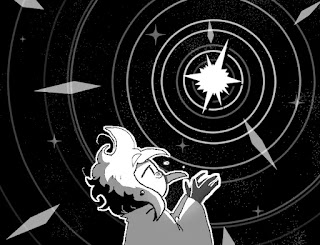What is self-efficacy? Simply put, it's a person's belief in their ability to achieve a certain goal, and how that belief shapes their decisions. If a person has a high level of self-efficacy and has to study for a test, that self-efficacy may lead them to set goals to study for the exam and do well, taking time to achieve mastery of the content.
As you may recall from previous posts, Siffrin does not have a high level of self-esteem, or self-efficacy for that matter. They do their best to portray a confident "funnyjokespun" persona to his friends, but they struggles with making mistake, especially mistakes that lead to his or the party's death/setback, leading to a new loop. While he keeps his goal of getting themself out of the time loop and saving his friends in the front of his mind, each successive loop builds the growing frustration and ever present insecurity that they're never going to free themself. Ideally, they get closer to their goal with every loop, learning the hidden secrets of the House to eventually help the party defeat The King but every new development (for instance, learning beating the King isn't enough and something bigger is wrong) slowly drains at Siffrin's motivation and their sanity.
In some regards, Siffrin demonstrates both a fixed and a growth mindset. For clarification, a growth mindset is the belief that you can develop your abilities/skills through hard work, and a fixed mindset being the belief that abilities are unchangeable or innate. Siffrin and their whole party can grow stronger and accrue new skills by exploring the House, which Siffrin acknowledges help them and the party, but has a fixed mindset on them as a person, thinking themself to be a bad person their friends haven't realized is a bad person yet and a failure who can't figure out how to save their friends on their own. Siffrin has no inclination to believe he can improve through the journey, attributing any successes to being lucky they have the time loop to bail them out of bad situations. To a degree, as Siffrin progresses through each loop, he gains some feelings of helplessness in his situation, or learned helplessness; the belief that a person cannot control or change their situation no matter what they do. Siffrin never stops trying to escape the time loops, and continues to try time and time again, but fails to recognize the true core of the issue. Siffrin is stuck because he doesn't want to leave the time loop.
Leaving the time loop, beating The King, would mean the journey is over. All of his friends have been telling him their plans for after the win, and it would mean the group goes their separate ways. Siffrin would lose his friends. Lose his family. Again. At least a family that they remember...Siffrin can't imagine a world where their friends still want him around after the journey's end; that they would want him around with no use for them. Maybe only they think so fondly of their friends and none of the party reciprocates. Siffrin is wrong of course, but he doesn't know that. Loop's, the mysterious helper, whole role is to help Siffrin come to this realization, to finally relinquish control of the loops and be free from this never ending performance. But Siffrin doesn't want to, deep down. So he ignores it, and becomes totally blind to it.
(Post originally for Week 5: written post Hurricane Helene)







No comments:
Post a Comment